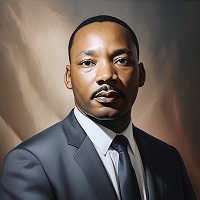

Quotes By Martin Luther King Jr.

Leader
Martin Luther King Jr.
Jan 15, 1929 - Apr 04, 1968
With all of her dazzling achievements and stupendous material strides, America has maintained its strange ambivalence on the question of racial justice.
White America has been backlashing on the fundamental God-given and human rights of Negro Americans for more than three hundred years.
The daily life of the Negro is still lived in the basement of the Great Society. He is still at the bottom despite the few who have penetrated to slightly higher levels. Even where the door has been forced partially open, mobility for the Negro is still sharply restricted. There is often no bottom at which to start, and when there is, there is almost always no room at the top.
There is the convenient temptation to attribute the current turmoil and bitterness throughout the world to the presence of a Communist conspiracy to undermine Europe and America, but the potential explosiveness of our world situation is much more attributable to disillusionment with the promises of Christianity and technology.
The deep rumbling of discontent that we hear today is the thunder of disinherited masses rising from dungeons of oppression to the bright hills of freedom in one majestic chorus.
Every revolutionary movement has its peaks of united activity and its valleys of debate and internal confusion. This debate might well have been little more than a healthy internal difference of opinion, but the press loves the sensational and it could not allow the issue to remain within the private domain of the movement. In every drama there has to be an antagonist and a protagonist, and if the antagonist is not there the press will find and build one.
The radical King was a democratic socialist who sided with poor and working people in the class struggle taking place in capitalist societies.
Virtually all of the Founding Fathers of our nation, even those who rose to the heights of the presidency, those whom we cherish as our authentic heroes, were so enmeshed in the ethos of slavery and white supremacy that not one ever emerged with a clear, unambiguous stand on Negro rights.
George Washington, Thomas Jefferson, Patrick Henry, John Quincy Adams, John Calhoun and Abraham Lincoln were great men, but-that "but" underscores the fact that not one of these men had a strong, unequivocal belief in the equality of the black man.
No human being is perfect. In our individual and collective lives every expression of greatness is followed, not by a period symbolizing completeness, but by a comma implying partialness. Following every affirmation of greatness is the conjunction "but." Naaman "was a great man," says the Old Testament, "but . . ."-that "but" reveals something tragic and disturbing-"but he was a leper.
Would the slower processes of legislation and law enforcement ultimately have accomplished greater results more painlessly? Demonstrations, experience has shown, are part of the process of stimulating legislation and law enforcement. The federal government reacts to events more quickly when a situation of conflict cries out for its intervention.
Through two centuries a continuous indoctrination of Americans has separated people according to mythically superior and inferior qualities while a democratic spirit of equality was evoked as the national ideal. These concepts of racism, and this schizophrenic duality of conduct, remain deeply rooted in American thought today.
Just as an ambivalent nation freed the slaves a century ago with no plan or program to make their freedom meaningful, the still ambivalent nation in 1954 declared school segregation unconstitutional with no plan or program to make integration real.
Just as the Congress passed a civil rights bill in 1868 and refused to enforce it, the Congress passed a civil rights bill in 1964 and to this day has failed to enforce it in all its dimensions.
Just as the Fifteenth Amendment in 1870 proclaimed Negro suffrage, only to permit its de facto withdrawal in half the nation, so in 1965 the Voting Rights Law was passed and then permitted to languish with only fractional and halfhearted implementation.
Popular Authors









